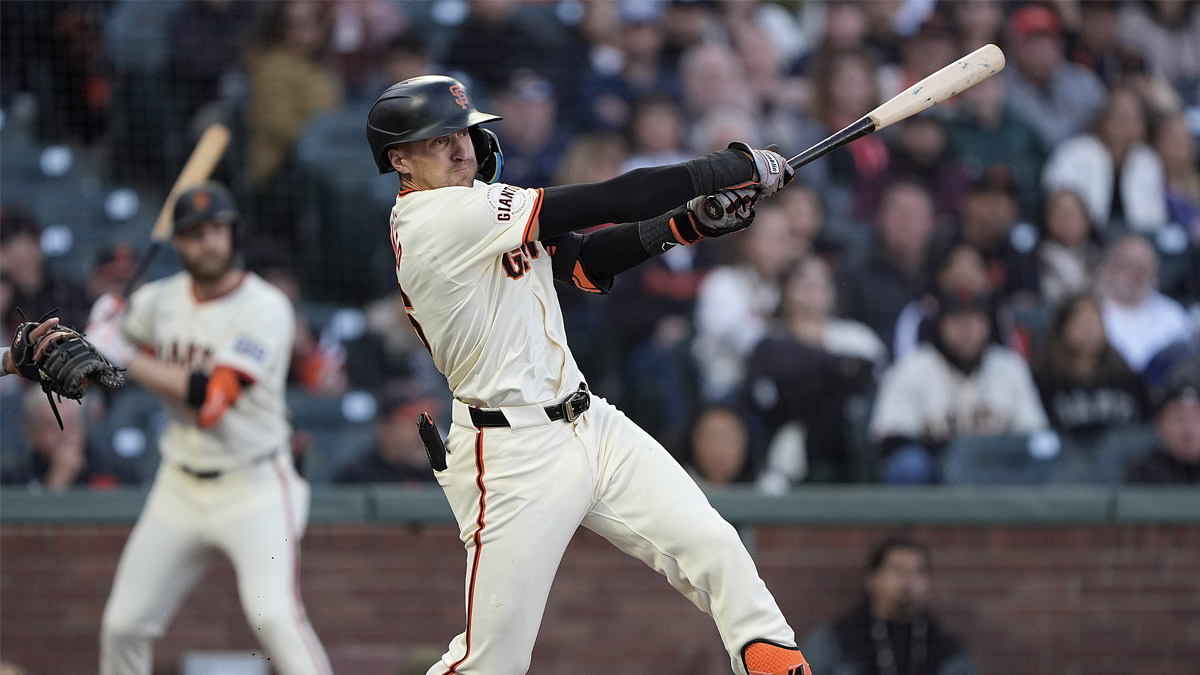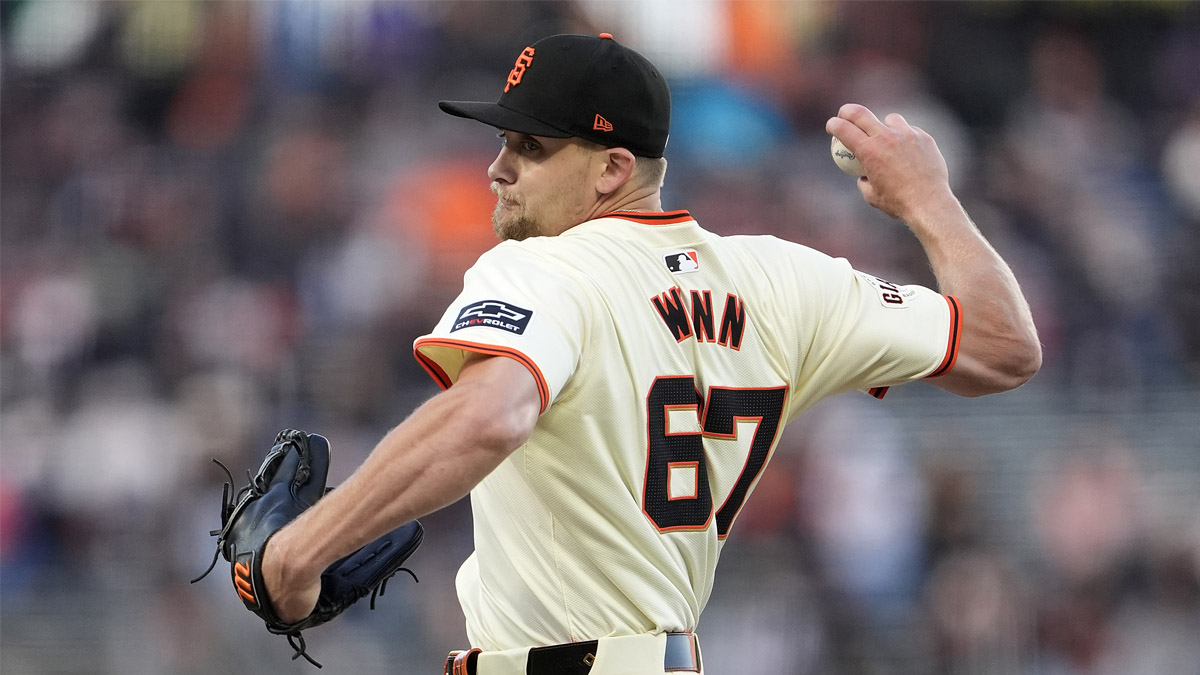The scoreboard at Oracle Park is 153 feet wide and 70 feet tall. It's the first 4K scoreboard in MLB, the most expensive improvement to the Giants' ballpark in the 20 years of its existence, and was, by all accounts, a popular addition last season.
But over the past month it served a new and unique purpose. During Summer Camp, the $10 million Diamond Vision board was the most expensive calendar in the world.
Bench coach Kai Correa brought a new level of organization to the clubhouse this spring, posting detailed daily schedules on a TV mounted vertically near the clubhouse door at Scottsdale Stadium. The days of drills and a lineup being posted to a corkboard in the morning were instantly gone. The Giants could change their schedule or BP groups with the click of a mouse or swipe of a finger, instantly relaying that information to players, and when Correa was tasked with figuring out how to run spring training at Oracle Park, he expanded on that early work.
Stay in the game with the latest updates on your beloved Bay Area and California sports teams! Sign up here for our All Access Daily newsletter.
The schedule was posted on the scoreboard at the start of each session, with players knowing down to the minute where they were supposed to be or what drill they were supposed to be doing. When simulated games started, position changes were noted in advance on the scoreboard. If a player or coach got lost, all he had to do was look to center field.
Day after day, drill after drill, the Giants followed that schedule. Each passing hour got them closer to actual baseball.
"It felt like an advent calendar," Correa said last week, "Except it was happening up on the scoreboard."
The Giants got through those three weeks in large part because of Correa, a 31-year-old who was plucked from the minor leagues by Gabe Kapler to be the youngest bench coach in the majors. For the first four games in Los Angeles and last night's home opener, every time the camera panned over to Kapler, Correa was standing just a few feet away, mask on, notes in hand, ready to help make the next decision.
San Francisco Giants
The bench coach is an important job in any dugout, but for Kapler, the position is crucial. The Giants might play the matchups more than any team in the big leagues, and Correa will be there every step of the way, trying to help Kapler push the right buttons. It's a job he has no experience with, but it's one Kapler felt he was perfectly suited for. When he was hired by Farhan Zaidi, Kapler knew what his next step would be.
"Kai was the first guy that I had to have on our staff," he said earlier this summer.
[BALK TALK: Listen to the latest episode]
Correa, a former infielder at the University of Puget Sound, is only three years removed from an assistant coach position at the University of Northern Colorado. He spent the previous two years working as an infield coordinator and defensive coordinator for the Cleveland Indians. That's a long way from the No. 2 job on a big league staff, but Kapler had been eyeing Correa for years.
He first became aware of Correa when Kapler was the farm director for the Dodgers and did some digging into a pool of college coaches. Correa had built a small following with instructional videos he posted on social media, and when Kapler became a manager, he interviewed Correa in Philadelphia in 2019 before ultimately going with a more experienced candidate.
When he met with Zaidi last fall, Kapler came prepared. Zaidi would ask potential managers about staff preferences and most rattled off three or four familiar names. Kapler presented a spreadsheet, with tiers of coaches who ranged from experienced, to less familiar, to less experienced but with upside. Correa fell into the last category. Neither Zaidi nor general manager Scott Harris had heard of him until getting a scouting report from Kapler.
"The impression that Kai made going through that interview process in Philadelphia really stayed with him," Zaidi said. "It's really a tribute to the depth of Gabe's research and knowing the baseball and coaching landscape in particular."
In that sense, Correa is no different than most of the players he is coaching. The Giants have made no secret of the fact they're trying to unearth gems -- the next Max Muncys or Mike Yastrzemskis -- at the big league level. Kapler is trying to do the same with his young coaching staff, and thus far Correa has drawn strong reviews.
The first camp was remarkably organized, a byproduct of Correa spending eight to 10 hours a day in the offseason working on schedules and defensive graphics that played on a loop on clubhouse TVs. When the Giants moved spring training to Oracle Park, the work ramped up. The Giants split into three groups, putting a cage in the left field corner for additional live BP sessions and a mound near the wall in left-center so pitchers could work on pickoffs. The players' parking garage was turned into a turf field and weight room. Correa and the rest of the coaches had a list of 12 bullet points of what the staff needed, and the facilities crew came through with all of them.
"There were a couple of factors. One was getting my hands on the blueprints of Oracle just to see every nook and cranny, and then it was about having really lengthy conversations with people like Wo (Ron Wotus) and Alyssa (Nakken) and Brad (Grems) about what we could do, and spending time in hallways and buildings and spaces," Correa said. "You find yourself in spaces you don't know. The other thing was really diving in on what's important. That's the fun thing about a camp like this, you take away all the frills."
Correa said he has leaned heavily on Wotus throughout this process, and for good reason. Wotus did the job from 1999 to 2017, planning schedules and workouts for two decades and helping his successor, Hensley Meulens, do the same. Ask Giants officials what has stood out about Correa so far and one thing they'll point to is humility and his ability to take a step back and let Wotus lead the way at times.
The new staff showed a willingness to be in the background in other ways, too. Because members of the grounds crew are Tier 3 individuals, they are not allowed to be on the field at the same time as players and coaches, deemed Tier 1. As the grounds crew watched drills, they noticed that coaches had taken the lead in moving cages and equipment when the grounds crew couldn't leave the stands.
All of that work got the Giants to this point, and on Tuesday night, they finally stood in their dugout at Oracle Park for a game that counted. Correa was thrown right into the fire, facing the Dodgers and their own analytics machine in his first series as a big league coach, and Kapler was pleased with the job he did over the weekend. He said Correa, as expected, came "especially prepared," and from the outside, the Giants seemed to have a good handle on their personnel during a four-game split.
[RELATED: Giants respond to Marlins coronavirus outbreak]
While the defense and execution were sloppy on the field at times, it was hard to quibble with any of the moves Kapler made when games were close, and he deftly managed his way through Saturday and Sunday's wins. His hand-picked right-hand man was there the whole time, soaking in his first big league series. For Correa, the start of actual games might have been a relief after all it took to get here.
"Once the games start, then it's just baseball," he said. "Then the competitive juices take over from there."


